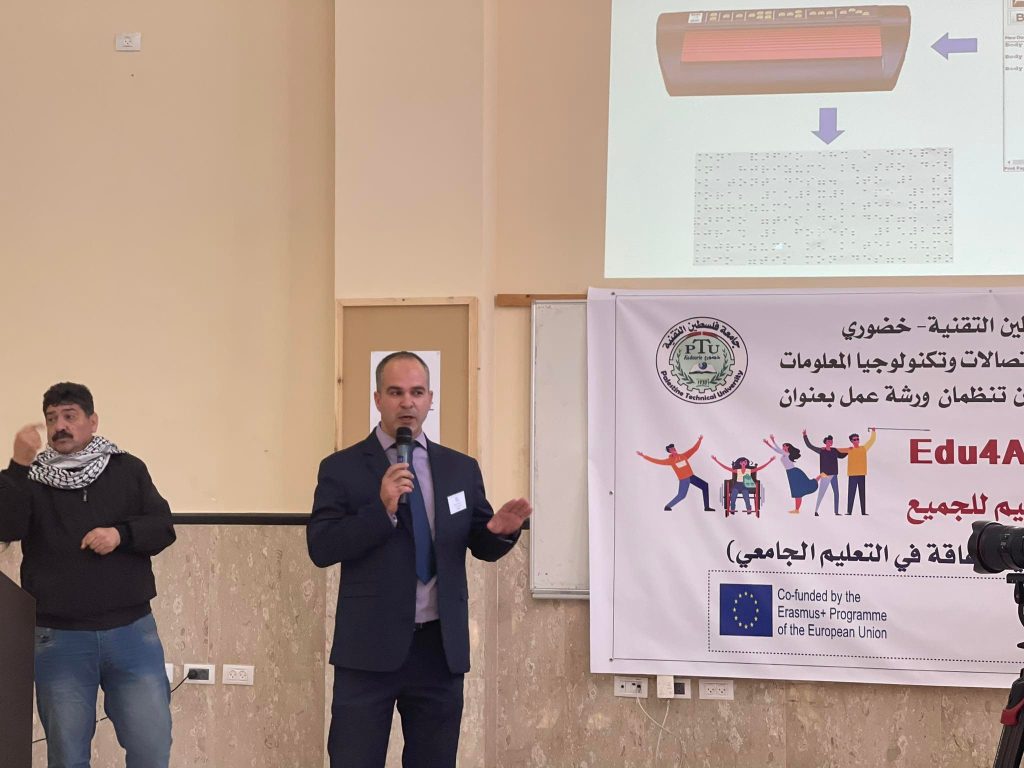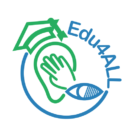Awareness Raising Workshop at PTUK

Edu4ALL
In 19/12/2021, Palestine Technical University Kadoorie (PTUK), in partnership with the Ministry of Communications and Information Technology and sponsored by Bank of Palestine, organized face-2-face awareness raising workshop entitled “Edu4ALL: Empowering and Including Students with disabilities in Higher Education”. The workshop aims at raising the awareness and illustrating the role of inclusive education and its impact for building the capacity of students with disabilities. More than 150 participants from Palestine attended the workshop including: The President of Palestine Technical University “Prof. Nouraddin Aburob”; 2) the Minister of Communications and Information Technology “Dr. Isaac Sidr”; 3) the Director of Public Affairs in the province on behalf of the Governor “Mr. Ibrahim AbdelAl”; 4) the Secretary-General of the Union of Persons with Disabilities “Mr Magdy Marei”; 5) the Director of the North Branches Department at Bank of Palestine, “Mr. Islam Jaidi”; 6) Director General of the General Administration of Persons with Disabilities in the Ministry of Social Development, “Mr. Ajaj Ajaj”; 7) Director of Training and Development at the Ministry of Communications and Information Technology, “Eng. Iyad Oraikat” and 8) the external evaluator of the Edu4ALL project. Moreover, several civil and community associations and institutions, in addition to persons with sight hearing and motor disabilities participated in the workshop. To ensure the accessibility for all deaf or hard of hearing persons, the workshop was interpreted with sign language.
The workshop discussed a number of issues facing persons with disabilities especially in terms of integrating them into university education, in addition to the mechanisms for overcoming all obstacles and difficulties that may hinder their path, and how to overcome obstacles and challenges in front of them.
The project coordinator “Dr. Eman Daraghmi” welcomes the attendees, thanking the attendees for their participation in this workshop which aims to support, empower and raise awareness about inclusive education and the right of students with disabilities in university education indicating that the issue of people with disabilities and their rights is a global concern, and the level of interest in this category has become a basic criterion to measure the civilization and development of nations. Dr. Daraghmi illustrates that the workshop comes on the sidelines of the Erasmus+ project funded by the European Union, which aims to establish an “Edu4ALL unit” that follows the international standards with the objective of equality in Education Activities, and Services for students with disabilities. It aims to empower students with disabilities academically, socially, and psychologically through 4 goals: 1) reach; 2) development; 3) equity & quality; 4) sustainability.
The unit will be equipped with the latest assistive technology to integrate students with disabilities into the programs offered at the university by following up their academic, personal and psychological needs and providing the environment and considerate means because of their personal and physical conditions, equality in education, student activities, and services thus enhancing their potential and independence. Dr. Daraghmi indicated that a number of local, regional and international universities participate in the project, as Kadoorie University is the main coordinator of the project.
The President of Palestine Technical University Kadoorie – Prof. Nouraddin Aburob illustrates that the university believes in the right to education for all especially persons with disabilities, and this is what Palestine Technical University Kadoorie pursues as a university for the state and for all Palestinians. Prof. Aburob confirmed that the university harnesses all its capabilities and laboratories in order to serve the local community, and the university is keen in its infrastructure to equip its facilities to suit students with disabilities and ensure the availability of a university environment that meets their needs, to build a generation capable of building an independent Palestinian state, wishing success for the partners in making this project a success and achieving Its national and humanitarian goals.
Dr. Sidr, the Minister of Communications and Information Technology expressed his happiness to participate in the workshop that seeks to empower and integrate persons with disabilities into university education pointing out that this workshop is an appropriate opportunity to emphasize the need to redouble efforts collectively, to ensure the dignity and rights of this great group, which is a common responsibility shared by individuals institutions, associations and government. Dr. Sidr briefed the attendees on the steps taken by the Ministry to facilitate the lives of citizens, especially those with disabilities, such as adopting the national policy for digital transformation and information security policy.
Mr. Marai thanked those in charge of this project for its importance and its contact with a large segment of Palestinian society, stressing that the union’s participation comes within the framework of shedding light on the reality of persons with disabilities. Mr. Marai emphasized the importance of the access to a safe university environment that is compatible with disabled students’ needs. He added that the social responsibility of universities must be invested, and various active institutions in society in order to reach an inclusive, embracing and diversified society in all its categories. He also stressed that there are many steps and measures taken by the government in order to integrate persons with disabilities, noting that there are many successful models that persons with disabilities have set up in many important positions.
On the other hand, Mr. Abdel-Aal stressed the importance of the workshop which deals with an important segment of citizens, namely the category of students with disabilities, to reveal the reality of their suffering and issues on the one hand, and to confront the challenges they face and realize their hopes. Mr. Abdel-Aal added that the Palestinian Authority, through the Ministry of Education, has for years been adopting projects to support the right to education for this category. The ministry has a comprehensive plan through laws and regulations that stipulate the harmonization of everything that serves this category of buildings, curricula, equipment, systems and support services, especially because they have proven their worth in various locations with the strength of their will and determination.
Mr. Jaidi expressed his happiness to participate in this workshop, indicating that Bank of Palestine support for this workshop stems from its keenness to support and strengthen this marginalized group of our society, and the need to involve and integrate it in all societal fields, including university education. He added, “We are proud to be part of these good efforts, which are consistent with our goals and vision, to apply the values methodology in banking work, by adopting the principles of sustainable financing, adhering to environmental and social standards, and enhancing the role of women, youth children and people with disabilities.”
Mr. Ajaj gave a presentation on the reality of persons with disabilities in Palestine, indicating that the statistics of the Palestinian Central Statistics Authority show an increase in their numbers relative to the total number of the population, noting that the education of persons with disabilities in Palestine began from an early age, as the field of blind education constituted a large part of this educational movement, which started at the beginning of the third decade of the last century and at various levels of school and university education. Mr. Ajaj added that Palestine is one of the first countries in implementing the right to education for people with disabilities in practical legal and human rights terms, as Palestine has committed to more than one hundred international agreements, including basic agreements on Human rights without reservations, and the International Convention on the Rights of Persons with Disabilities. Mr. Ajaj also listed a number of obstacles facing persons with disabilities in obtaining university education, including the absence of unified regulations or executive regulations binding on all universities, colleges and institutes regarding the education of persons with disabilities, in addition to societal obstacles, which are represented in: The stereotypical image of some families about the importance of university education for people with disabilities, especially girls, as environmental obstacles related to the ease of access to universities and colleges. This is in addition to the extent to which the university’s physical environment is compatible with the individuals of this category and the general design of services, programs and others.
During the meeting, some success stories were presented to people who overcame audio-visual and motor disabilities and practiced their professional and educational lives with high efficiency. Then, the Jerusalem Electricity Company, in cooperation with the Palestinian Energy Incubator, presented innovations that would improve the lives of persons with disabilities.
Dr. Yousef Daraghma gave a presentation on the devices and tools that will be included in the project and that will serve people with audio, visual and movement disabilities. In this context, Mr. Jawad Abu Own presented how to achieve digital access by designing websites to be suitable for people with disabilities.
At the end of the workshop, a panel discussion was held and guided by Mr Zafer Hasouna to discuss the conditions and needs of people with disabilities. The participants in the workshop agreed on the need to pay attention to the category of persons with disabilities by strengthening the partnership between them and the various educational, civil and official institutions and the private sector to enhance their capabilities by searching for ideas and creative solutions, enabling them to overcome the difficulties of daily life, in addition to integrating them further in the discussion of various issues of interest to them at various levels.
